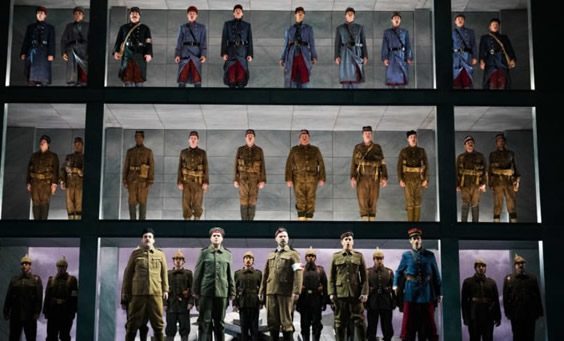A Timely Opening for ‘Silent Night’
By • November 12, 2018 0 805

On any other night, the Washington National Opera presentation of “Silent Night,” by composer Kevin Puts and librettist Mark Campbell, in the Kennedy Center’s Eisenhower Theater could have been just another busy and buzzy opening night at the opera.
It was. And mostly it wasn’t. It was, particularly on this night and in this time, a very different opera night, a very different opera, over and above and around the fact that it was a representative example of a “new” or “contemporary” opera.
Running through Nov. 25, this staging is from the Wexford Festival and in partnership with the Atlanta Opera and the Glimmerglass Festival. The opera premiered at Minnesota Opera back in 2011, garnering a Pulitzer Prize the following year for Puts.
“Silent Night” has gained in popularity and has been repeatedly staged, but the time itself and timing injected something into the evening that took on the nature of an event, with an overlay of urgent immediacy and an underpinning of intimacy for many in the audience.
This was, after all, a night which would be followed the next day by the formal commemoration of the 100th anniversary of the signing of the Armistice which ended World War I, marked by a gathering of world leaders, including President Donald Trump, in Paris.
The ongoing events in Europe — heartfelt, somber, at times controversial — echoed mightily during the course of the performance of “Silent Night,” providing a large-tent context to a true story that occurred on the Western Front, near Belgium, on Christmas Eve, only some four horrific months after the start of World War I. Many of the audience members must have felt some kinship with the names of the dead seen in a moving list on stage.
Almost from the beginning the audience was in the midst of a highly resonant atmosphere, in which the stories of a group of Scottish, French and German soldiers were each presented in a layered, horizontal stack that resembled floors in a parking garage.
Things began with what appeared to be an actual performance of a quasi-real opera, a Mozartian gambol for high-ranking German aristocrats by soprano Anna Sorensen (Raquel González) and tenor Nikolaus Sprink (Alexander McKissick), who are a couple. Sprink is drafted, and joins a German unit after the start of hostilities.
We see two brothers in Scotland, who volunteer and head for France with their village priest. Occupying the middle level is the French Lt. Audebert, who feels compelled to volunteer, leaving behind his pregnant wife.
And now it’s Christmas eve, and all are already wearied, worn out by the war. One of the brothers has been killed, mourned violently by his sibling. Anna and Nikolaus head off for the front.
And suddenly, everything changes. The Scots play mournful music on their bagpipes, Christmas trees from the crown prince arrive for the German contingent, while the French open bottles of champagne. And Sprink, the German, runs into no man’s land and no one shoots. Sprink and Sorensen sing for the troops.
Soon enough, the leaders — the German captain, the French lieutenant, the Scottish commander — are exchanging greetings, singing, giving out their names. For one day, they declare a truce, a cease-fire.
That’s the essence of the event. Soldiers, speaking different languages, wearing different uniforms, all bearing arms, see each other for a time as if naked. They laugh, the French drink German beer, the Germans taste French chocolate (“sehr gut”), the Scots share food and all join together for a Christmas Eve Mass led by the Scottish priest. “It’s my first Christmas,” the German commander says. “I’m Jewish.”
And what do Puts and Campbell do with all this, musically and word- and world-wise? There are arias, to be sure, and impassioned furious outbursts of grief and hopelessness. There are songs and musical exchanges that sound like colloquial conversation of some higher and sometimes lower order. There are sprinklings of music as noise, indicating spent feelings.
It seems to me that Puts has found music — some of it atonal or discordant, some of it lyrical — in all of the men, not to mention the glorious voices of González and McKissick.
The singing resembles personality more than songs: deep roars from the general, some terrible longing and melancholy for the French commander, the brotherly, keening anguish of the brotherless young man and so on. But things overlap. You often hear the nuanced musical implications of a corpse put on a stretcher, the faraway, rising thunder of artillery, the memories carried of life before insanity.
Puts, it seems has found a companion to Campbell’s words. It’s a match steeped in empathy for the narrative and reality of the narrative. The collaboration of words and music share a sympathy for a fraught, unique moment.
There’s no way of knowing what subsequent audiences will react to here. The singing and performing is all done by former and current members of the Domingo-Cafritz Young Artist Program and the WNO Chorus to great and fresh effect. That particular performance was in the service of the service men, in honor of the veterans of the U.S. Armed Forces, and the next day was both Armistice Day and Veterans Day, but the days and nights after that belong to everyone.
There was in the course the performance a kind of movement and rising of symphonic-sized scoring, but other moments resembling a shared sigh. It seemed music both old and new, and it spoke to the uncommon commonality both seen and heard on stage.

